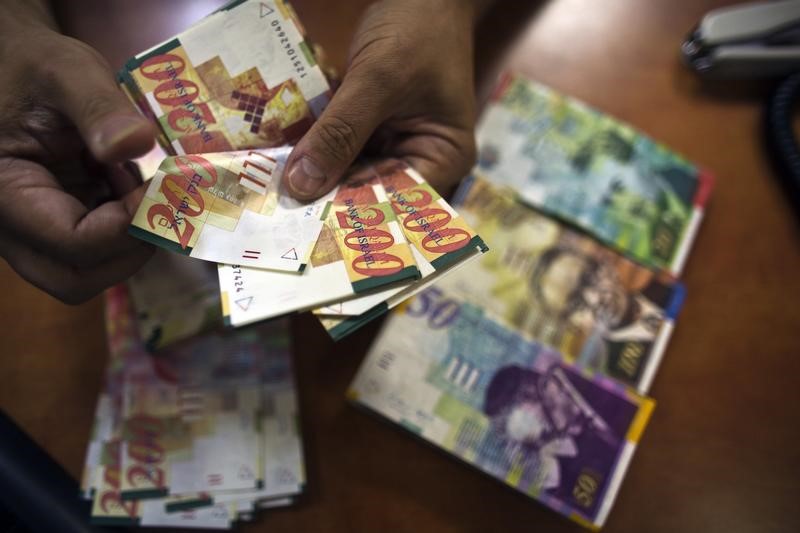By Steven Scheer
JERUSALEM (Reuters) - The shekel has become more over-valued recently and does not reflect the real strength of the Israeli economy, the deputy central bank chief said, adding that the bank will continue to buy foreign currency to try to soften the shekel
The shekel has appreciated 6 percent against the dollar this year to 3.645, its strongest level since October 2014, and is also hovering at a 15-year peak against the euro (EURILS=).
Against a basket of currencies of Israel's main trading partners the currency has risen more than 7 percent over the past year.
"The shekel is over-valued and that has become more strongly so in the past few months," Bank of Israel Deputy Governor Nadine Baudot-Trajtenberg said. "We think fundamentals point to a weaker shekel."
Europe and the United States are Israel's main trading partners, so a strong shekel against their currencies weighs on Israeli exports, which account for more than 30 percent of economic activity, as well as local producers battling imports.
"Foreign exchange intervention is very much on the table and we will continue to use it if we think the exchange rate will depress the economy ... We feel intervention is effective," Montreal-born Baudot-Trajtenberg told Reuters.
In the second half of 2016, the central bank bought $2.6 billion of foreign currency and another $50 million in January. Market sources said the bank bought hundreds of millions of dollars more in February.
Not everyone agrees with the central bank about the value of the shekel, however. David Woo, head of global rates and currencies research at Bank of America Merrill Lynch (NYSE:BAC), told the Calcalist newspaper this week that without intervention, the shekel could be as much as 20 percent stronger.
Woo and other analysts believe the shekel's strength stems from robust economic data. Israel's economy grew a faster than expected 4 percent in 2016, although it is forecast to slow to 3.2-3.5 percent this year.
Intervention has also left Israel with a huge pile-up of foreign currency reserves. Since 2008, the country has bought some $70 billion of foreign currency, bringing its official exchange reserves to above $100 billion.
RATE HIKE?
Baudot-Trajtenberg, who has served as deputy to Governor Karnit Flug since March 2014, maintains that economic growth could be stronger, however.
"We are seeing nice growth but we are not seeing a real step-up in the growth of the economy," she said, adding that by growth per capita "the economy in Israel is doing OK, but it is not much better than our trading partners".
Israel has an annual population growth rate of about 2 percent versus zero for much of the West, she said.
At the same time, Israel is competing with expansionary policies around the world that have weakened many currencies, as well as political and economic uncertainty in the United States and Europe, she added.
The Bank of Israel on Monday held its benchmark interest rate
The inflation rate moved to 0.1 percent in January and the central bank expects it to reach the target within a year.
"This growth is very much sustainable without getting into an inflationary period. In normal times you would expect inflation to be at a higher level than now," because business sector wages are rising, Baudot-Trajtenberg said.
"One reason why we kept rates very low is because inflation has not given us reason for putting brakes on the economy," she said. "We still think that rates are likely to remain low for a substantial amount of time."
Central bank economists expect to see a 15 basis-point rate increase in the fourth quarter and another quarter-point hike in 2018. One policy member believes the pace will be quicker but Baudot-Trajtenberg declined to speculate on the timing.

"To raise rates, you need to have a different picture of the economy," she said. "Inflation is low but growth per capita is not faster than our trading partners."